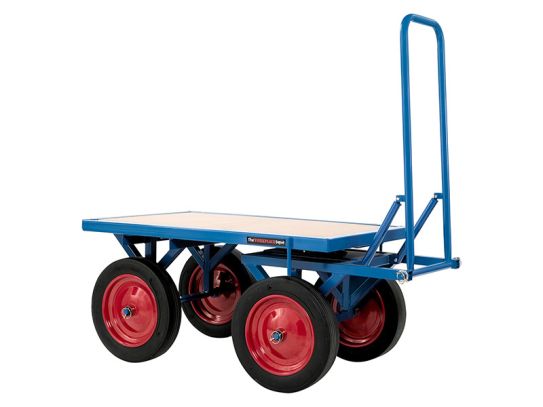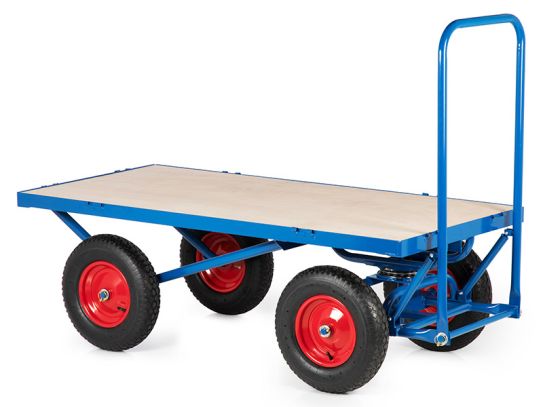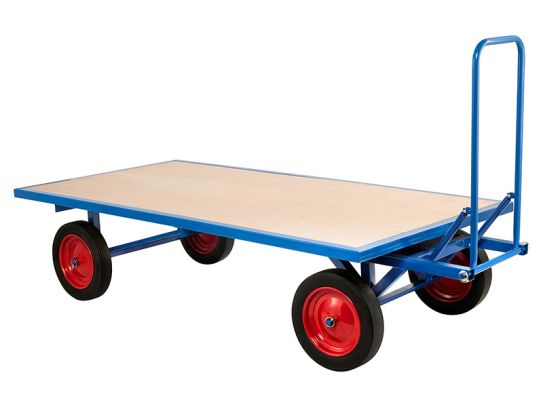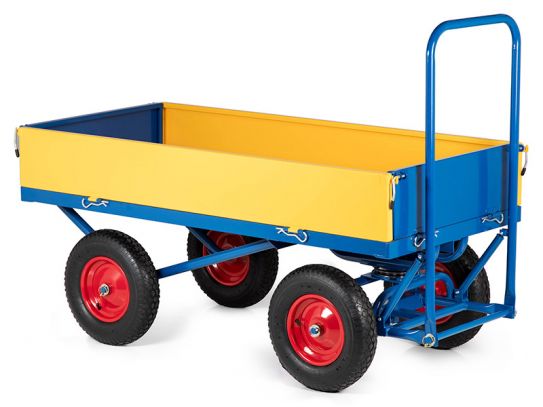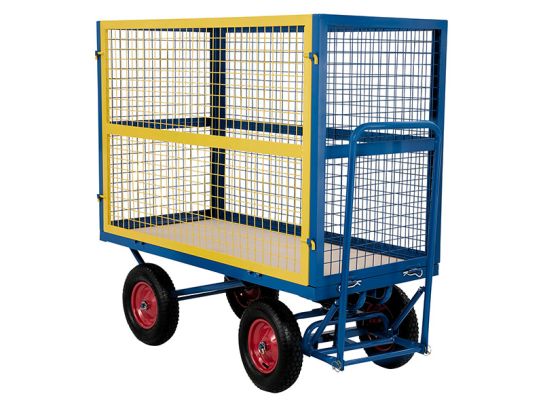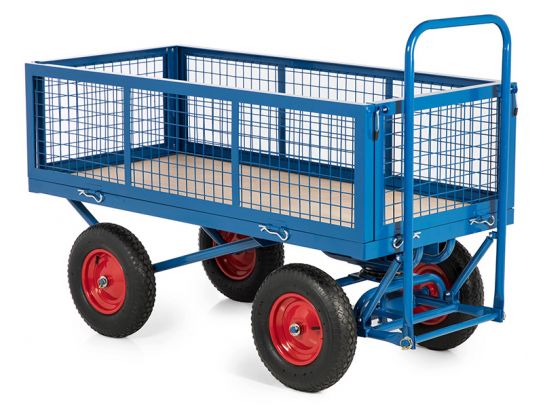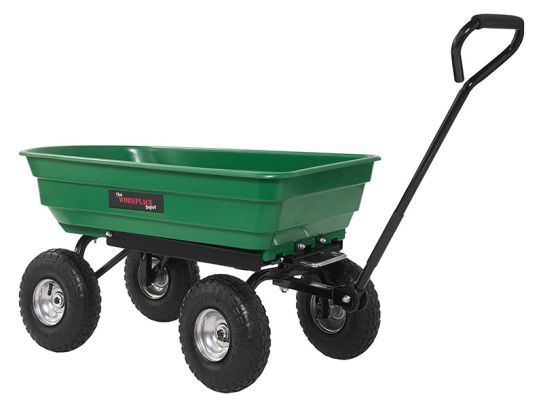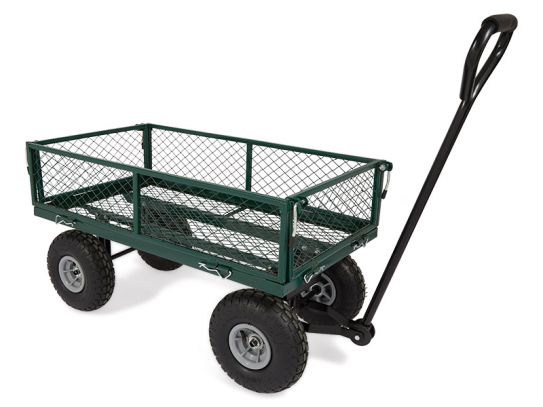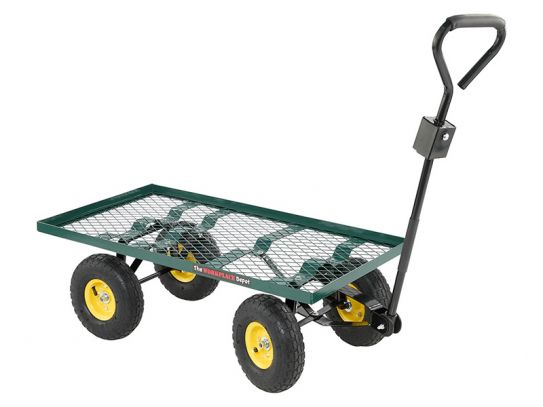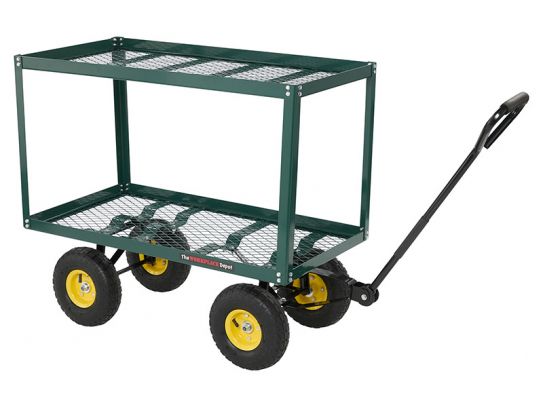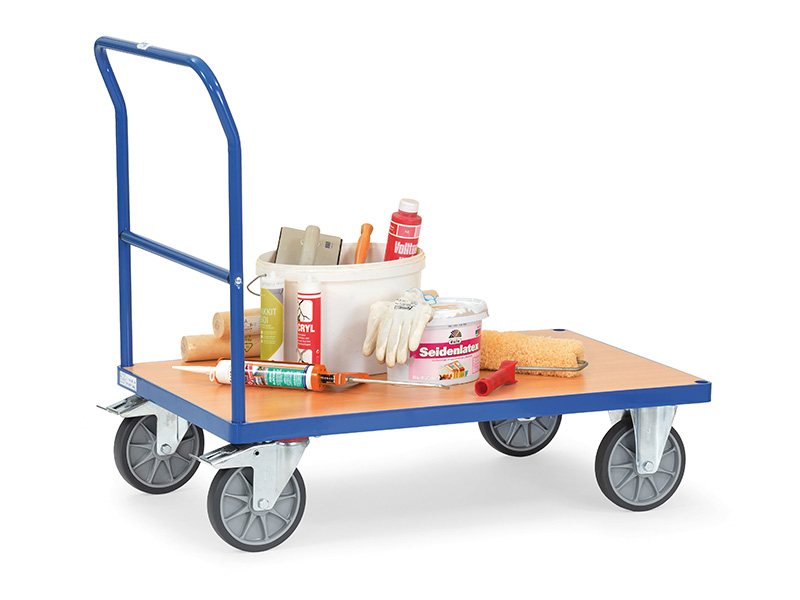Turntable Trucks
Effortless Manoeuvrability for Heavy Loads
Are you tired of struggling to manoeuvre heavy loads in tight spaces? Our turntable trucks are the solution you've been looking for! With its unique turntable-style steering, our trucks can easily rotate on its axis, allowing you to navigate through even the most crowded warehouses and factories with ease. With a variety of attachments available, our turntable trucks can handle any load you throw its way. Whether you need to transport goods from one area of your facility to another, or simply need a reliable and manoeuvrable vehicle for your industrial setting, our turntable trucks are the perfect choice. Don't miss out on convenience and versatility - order now!
What Are Turntable Trucks?
A turntable truck is a type of vehicle that is used to transport goods or materials. It is typically a large truck with a flatbed trailer that can be rotated, or "turned," on its axis. This allows the truck to be used in tight spaces or to easily unload materials in different directions. Turntable trucks are commonly used in construction, manufacturing, and logistics industries.
What Is a Manual Turntable Truck?
A manual turntable truck is a type of turntable truck that is operated using manual labour rather than using a motor or other power source. This means that the truck's trailer can be rotated using a hand crank or other mechanical means, allowing the operator to control the direction of the trailer. Manual turntable trucks are useful in situations where electricity or other power sources are not readily available, or where the truck needs to be used in tight spaces where a powered turntable truck may not be able to manoeuvre.
What Are the Benefits of a Turntable Truck?
There are several benefits to using a turntable truck for transporting goods or materials.
- First, the turntable feature allows the truck to be used in tight spaces where a traditional truck may not be able to manoeuvre. This makes it ideal for use in crowded warehouses, narrow streets, or other confined areas.
- Second, the ability to rotate the trailer allows for easier unloading of materials in different directions. This can save time and labour compared to having to reposition the entire truck to unload materials in a specific direction.
- Third, turntable trucks can be more versatile than traditional trucks, as they can be used for a wider range of tasks. For example, a turntable truck can be used to load and unload materials from different sides, to transport large or awkwardly-shaped items, or to load and unload multiple containers or pallets at once.
The use of a turntable truck can help to improve efficiency, reduce labour costs, and increase the versatility of a company's transportation operations.
How Do You Operate a Turntable Truck?
The specific steps for operating a turntable truck may vary depending on the specific model and design of the truck. In general, however, the following steps may be involved in operating a turntable truck:
- First, the operator should ensure that the turntable truck is parked on a level, stable surface and that the trailer is properly secured.
- Next, the operator should locate the mechanism for rotating the trailer, which may be a hand crank or other mechanical device.
- The operator should then engage the mechanism to rotate the trailer in the desired direction. Depending on the design of the truck, this may involve turning a handle or lever, or using a hydraulic or other powered system to rotate the trailer.
- Once the trailer is in the desired position, the operator can then use the truck's lifting mechanism (such as a hydraulic lift or winch) to load or unload materials onto the trailer.
- Finally, once the materials have been loaded or unloaded, the operator can then rotate the trailer back to its original position and prepare to move the truck to its next destination.
It is important for the operator to follow all safety procedures and guidelines when operating a turntable truck, to ensure the safe and efficient transport of materials.
Are There Any Safety Issues with Turntable Trucks?
As with any type of vehicle, there are potential safety issues to be aware of when using a turntable truck. Some potential safety concerns to consider include:
- The turntable mechanism itself can be a potential hazard if it is not properly maintained or operated. For example, if the mechanism is not properly lubricated, it can cause the trailer to rotate unevenly or unexpectedly, potentially leading to accidents or damage to the truck or its contents.
- The trailer of a turntable truck can be heavy and unwieldy, especially when fully loaded. This can make it difficult to manoeuvre the truck, and can increase the risk of accidents if the operator is not careful.
- If the turntable truck is used to transport heavy or awkward items, there is a risk of these items falling off the trailer during transport. This can be a serious safety hazard, both to the operator and to anyone in the vicinity of the truck.
- Turntable trucks are typically large vehicles, and as such, they can be difficult to manoeuvre in tight spaces. This can increase the risk of accidents if the operator is not careful, especially if the truck is being used in crowded warehouses or other confined areas.
Overall, it is important for operators of turntable trucks to be properly trained and to follow all safety guidelines and procedures to minimise the risks associated with using these vehicles.
How Do I Maintain My Turntable Truck?
Proper maintenance is an important aspect of ensuring the safe and efficient operation of a turntable truck. The specific steps involved in maintaining a turntable truck may vary depending on the make and model of the truck, but some general guidelines to follow include:
- Regularly inspect the truck for any signs of wear or damage, such as cracks or damage to the turntable mechanism, the trailer, or the truck's tires.
- Check the truck's fluid levels, such as the engine oil, transmission fluid, and brake fluid, and top up as needed.
- Regularly lubricate the turntable mechanism, as well as any other moving parts on the truck, to ensure that they are operating smoothly and without any binding or stiffness.
- Check the truck's tires for proper inflation and tread depth, and replace any tires that are worn or damaged.
- Regularly clean and wash the truck to remove any dirt, debris, or other contaminants that could affect its performance or safety.
- Follow the manufacturer's recommended maintenance schedule for the truck, which may include specific tasks or procedures to be performed at regular intervals.
By regularly maintaining your turntable truck, you can help to ensure that it continues to operate safely and efficiently, and can help to extend its lifespan.
What Are the Different Types of Turntable Truck?
There are several different types of turntable truck that are available, each designed for specific applications and purposes. Some common types of turntable truck include:
- Manual turntable truck: This type of turntable truck is operated using manual labour, typically using a hand crank or other mechanical means to rotate the trailer. Manual turntable trucks are useful in situations where electricity or other power sources are not available.
- Powered turntable truck: This type of turntable truck uses a motor or other power source to rotate the trailer. This can make the truck easier to operate and can allow for faster, more precise movements of the trailer.
- Hydraulic turntable truck: This type of turntable truck uses a hydraulic system to rotate the trailer, typically using a series of hydraulic pistons or other mechanical devices to move the trailer. Hydraulic turntable trucks are often used for heavy-duty applications or for moving large or heavy loads.
- Swivel-wheel turntable truck: This type of turntable truck has a trailer with a set of swivelling wheels, which allows the trailer to be rotated without the need for a separate turntable mechanism. Swivel-wheel turntable trucks are often used for moving large or heavy items, as the swivelling wheels can help to distribute the weight of the load evenly.
The type of turntable truck that is best suited for your needs will depend on the specific tasks and applications that you will be using it for.
Do Different Types of Wheels Affect the Performance of Turntable Trucks?
Yes, the type of wheels used on a turntable truck can affect its performance in different ways. Different types of wheels can have different characteristics, such as different sizes, materials, or tread patterns, which can affect the truck's performance in different ways. For example:
- Larger wheels can provide better ground clearance and can help to improve the truck's ability to navigate over uneven or rough terrain.
- Smaller wheels can make the truck more manoeuvrable and can help to improve its stability and handling, especially when the truck is fully loaded.
- Wheels made from different materials, such as rubber or metal, can have different characteristics that can affect the truck's performance. For example, rubber wheels may provide better traction on wet or slippery surfaces, while metal wheels may be more durable and suitable for heavy-duty applications.
- Different tread patterns on the wheels can also affect the truck's performance. For example, a tire with a deep, aggressive tread pattern may provide better traction on muddy or off-road surfaces, while a tire with a smooth, slick tread pattern may be better suited for use on smooth, paved surfaces.
The type of wheels that is best suited for a turntable truck will depend on the specific tasks and applications that the truck will be used for. It is important to choose the right type of wheels to ensure that the truck performs optimally and safely.
Are There Any UK or European Industry Standards or Regulations That Apply to Turntable Trucks
Yes, there are several industry standards and regulations that apply to turntable trucks in the UK and Europe. These standards and regulations are intended to ensure the safety and performance of these vehicles, and to protect operators and other workers who use them.
In the UK, turntable trucks are subject to the Machinery Directive 2006/42/EC, which sets out general safety requirements for machinery used in the workplace. This directive covers a wide range of safety issues, including the design, construction, and operation of turntable trucks.
In addition to the Machinery Directive, turntable trucks in the UK must also comply with the Lifting Operations and Lifting Equipment Regulations 1998 (LOLER), which apply to any equipment used for lifting or moving loads. This regulation sets out specific requirements for the design, testing, and use of turntable trucks, to ensure that they are safe and fit for their intended purpose.
In Europe, turntable trucks are also subject to the European Standard EN 12999, which sets out specific requirements for the design, construction, and testing of these vehicles. This standard covers a range of safety issues, including the strength and stability of the turntable mechanism, the load-bearing capacity of the trailer, and the visibility and safety markings on the truck.
Overall, these standards and regulations help to ensure that turntable trucks in the UK and Europe are safe and fit for their intended purpose, and help to protect operators and other workers who use these vehicles.
